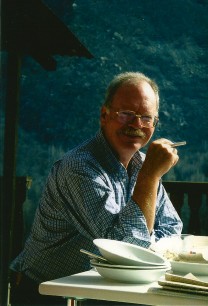Prof. Dr. em. Wolfgang Marschall was born in 1937 in Hirschberg, Silesia. There he spent his childhood years. His father, a pastor who got into conflict with the Nazi regime, died in World War II in 1940. During the war Marschall could not regularly attend primary school and eventually witnessed the russian occupation. In 1946 his family had to move west and resettled in North-Rhine Westphalia. Marschall finished school in 1957 and took up his studies of Anthropology and Prehistory in Cologne.
After a few semesters Marschall moved to Munich in order to continue his studies there. Lázló Vajda and Hermann Baumann were among his teachers. In 1964 Marschall graduated with a thesis on metal processing in Indonesia. Immediately he took up an assistant position at the Department of Cultural and Social Anthropology in Tübingen, where Thomas S. Barthel held a full professorship.
In 1965/66 Marschall did a field research in the Puebla region in Mexico. After his return he was not only giving numerous lectures but in 1970 also completed his habitation thesis on transpacific cultural relationships. Eventually he moved to the United States and gave lectures at the Antioch College in Ohio for a year. In 1971 Marschall returned to Tübingen and took up a professor position. Two years later he did a field research in Indonesia, where he collected data over a period of twelve months.
From 1976 until his retirement in 2003 Marschall held a full professorship at the Institute for Social Anthropology in Bern, Switzerland. Among his many tasks were not only the extension of the Institute and its library, but also the collaboration with the local Historical Museum. Furthermore Marschall consequently supported the interdisciplinary work with several other humanities in Bern, such as Sociology or Religious Studies.
Marschalls interests include historical processes as well as sociocultural phenomena. He also emphasizes the necessity of both a theoretical approach and precise field research. His regional focus is mainly on South East Asia.
Short Portrait: Wolfgang Marschall

Wolfgang Marschall
 further information
further information

